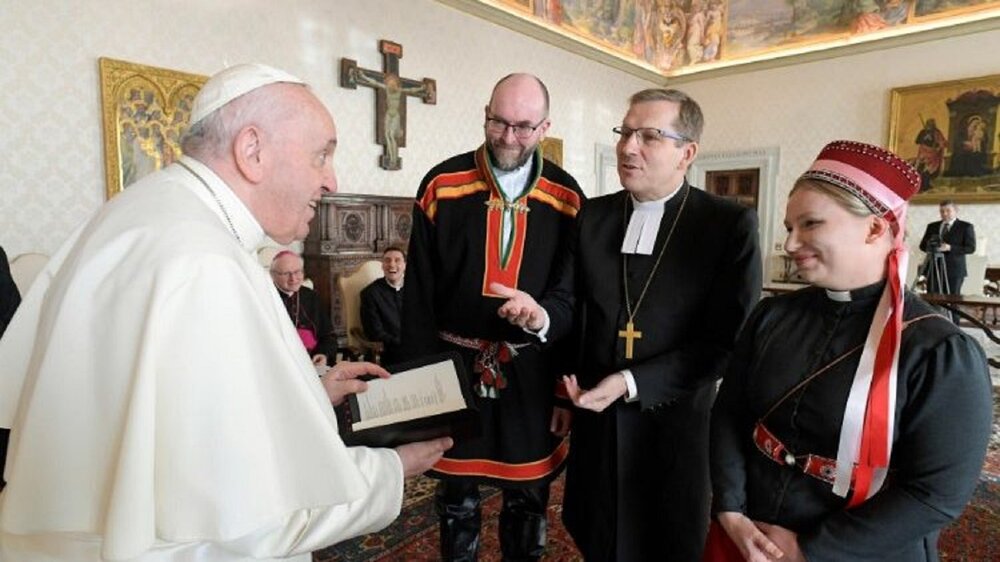Hawzah News Agency –Pope Francis began his address to the Ecumenical Delegation from Finland with a reflection on the Magi, the Wise Men of the Gospel who found the Child Jesus and worshipped Him.
“The Magi reached the goal because they sought it,” the Pope said. “Yet they sought it because the Lord, by the sign of the star, had first set out in search of them.” Like the Magi, we too are sought by God, “and our response must surely be like that of the Magi: a journey together.”
Journeying together
The Holy Father insisted, “Those who are touched by God’s grace cannot turn in on themselves and live only for themselves; they are always on the march, always driven to go forward — and to go forward together.”
Again, like the Magi, whom tradition represents as representatives of diverse cultures and peoples, Christians today are “challenged to take our brothers and sisters by the hand… and move forward together.” Pope Francis encouraged Christians to help one another advance “ever closer to God.”
In this journey together, the Pope noted that some stages are easier, allowing us to “advance rapidly with perseverance.” He gave the example of works of charity, which draw us closer not only to the poor and needy but also to one another.
On the other hand, the journey toward full unity is sometimes more difficult, which “can lead to a certain weariness and temptation to discouragement.
The Pope encouraged Christians to remind themselves “that we are making this journey not as those who already possess God, but as those who continue to seek Him.” He called for courage and patience along the way, in order to encourage and support one another.
Two important moments
Pope Francis pointed to two upcoming anniversaries as “important moments” in the ongoing journey towards Christian unity: the 1700th anniversary, in 2025, of the Council of Nicea; and the 500th anniversary of the Lutheran Augsburg confession.
The Pope noted that the “Trinitarian and Christological confession” of Nicea unites all the baptized, and he encouraged all Christians to renew their enthusiasm for following Christ. “For it is Christ,” the Pope said, “whom the men and women of every time, including our own, are seeking, however unconsciously.”
The Augsburg Confession, on the other hand, was produced at a time “when Christians were about to set out on different paths” during the time known as the Protestant Reformation.
The Confession was an attempt to preserve unity, the Pope noted, although it did not succeed in preventing division. However, he said, the upcoming anniversary “can serve as a fruitful occasion to encourage and confirm us on our journey of communion, so that we can become more docile to God’s will, and less beholden to human strategies; more disposed to follow the route pointed out by Heaven than to pursue worldly aims.”
Dreams for indigenous peoples
Pope Francis also thanked Bishop Jukka Keskitalo, of the Finnish Evangelical Lutheran Church, for having taken up his dream for Amazonia in relation to the indigenous peoples of Finland.
“It occurs to me,” the Pope said, “that a pastor must be concrete with concrete people, but that he must not allow himself to stop dreaming. Thank you for dreaming.”
When will we achieve unity
Finally, the Holy Father asked, “When will unity be achieved?” He recalled the remark of a “great Orthodox theologian” who said that “Unity will be in the eschaton” – that is, not until the final consummation of time.
Nonetheless, the Pope insisted, “the path to unity is important.” While the work of theologians and specialists is necessary and good, he said, “it is also good that we, God’s faithful people, go on the journey together.”
Pope Francis invited Christians to continue to journey together “in seeking God boldly and in concrete ways” and to “keep our gaze ever fixed on Christ,” while remaining “close to one another in prayer.” The Pope concluded his address by leading those present in praying together the Our Father.
Keeping our gaze fixed on Christ
Finally, Pope Francis invited Christians to continue to journey together “in seeking God boldly and in concrete ways” and to “keep our gaze ever fixed on Christ,” while remaining “close to one another in prayer.”
The Pope concluded his address by leading those present in praying together the Our Father.


Your Comment